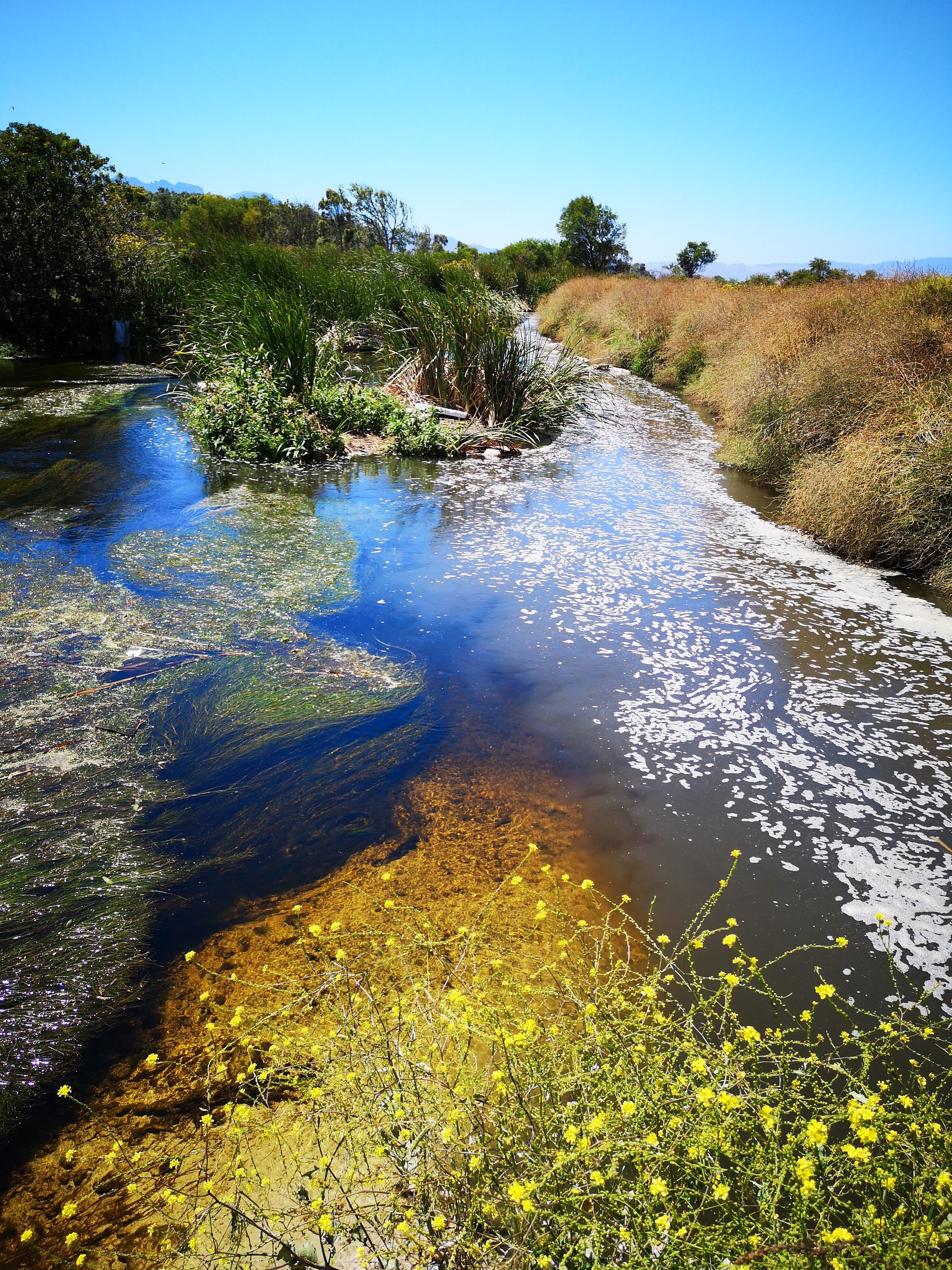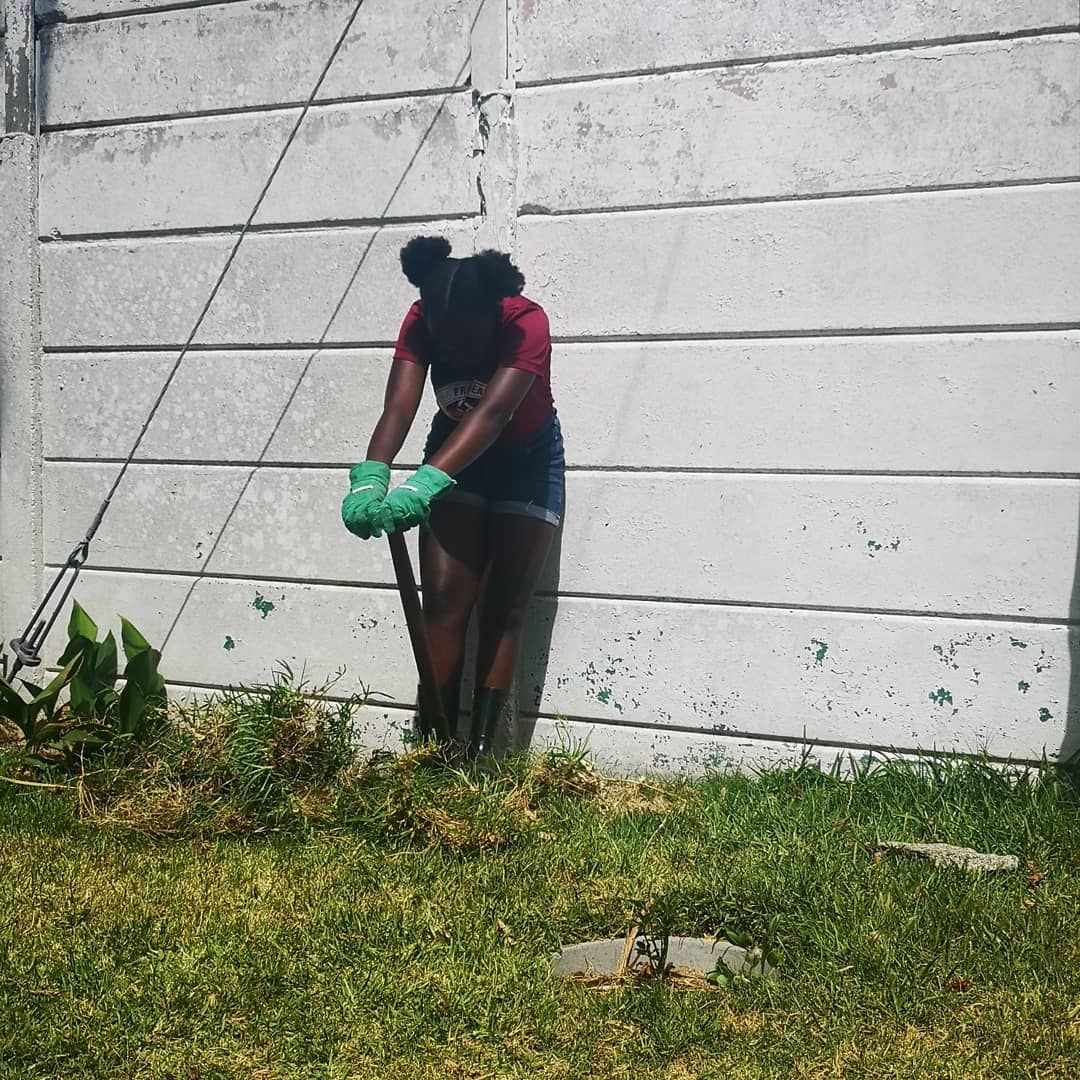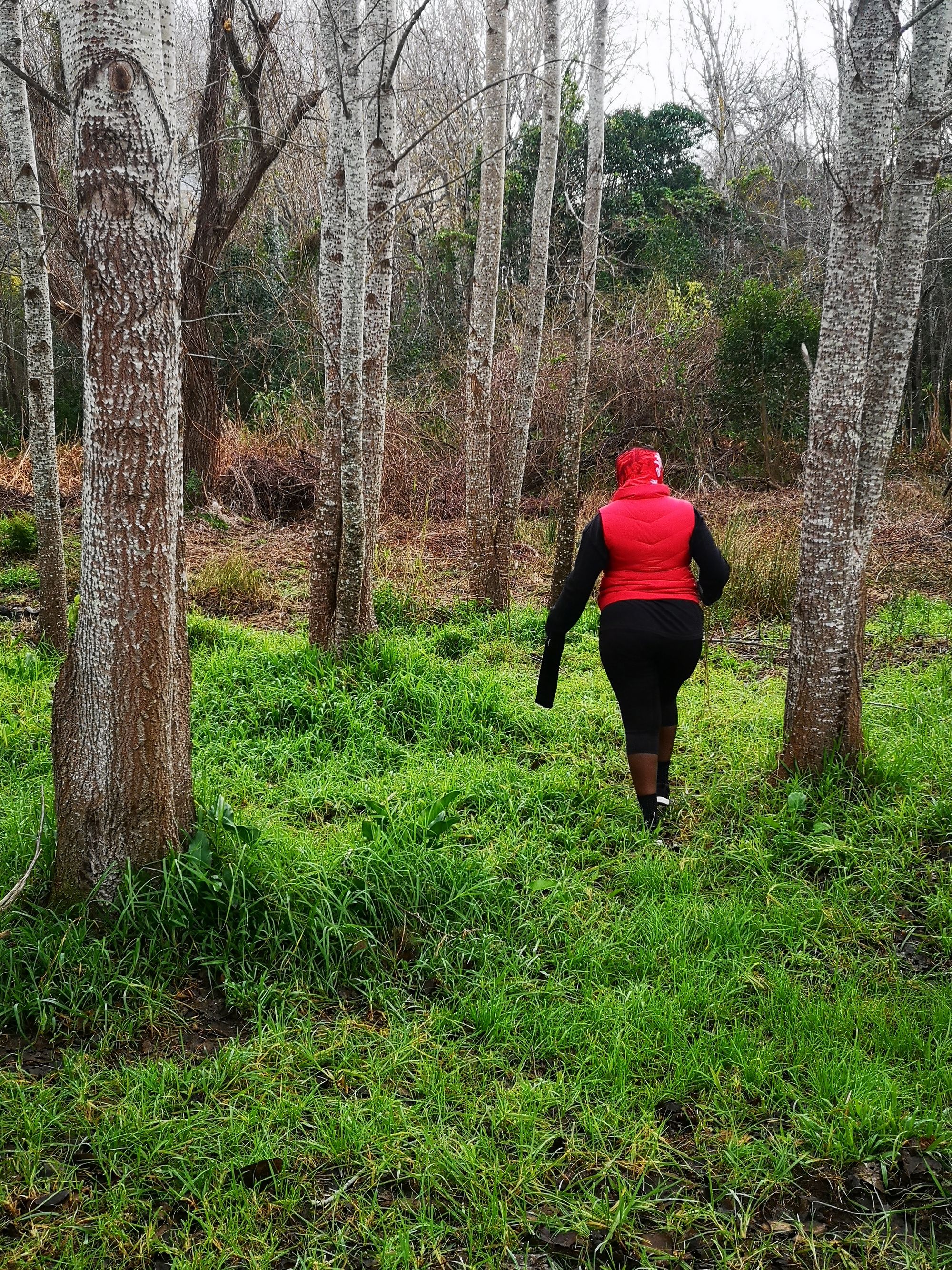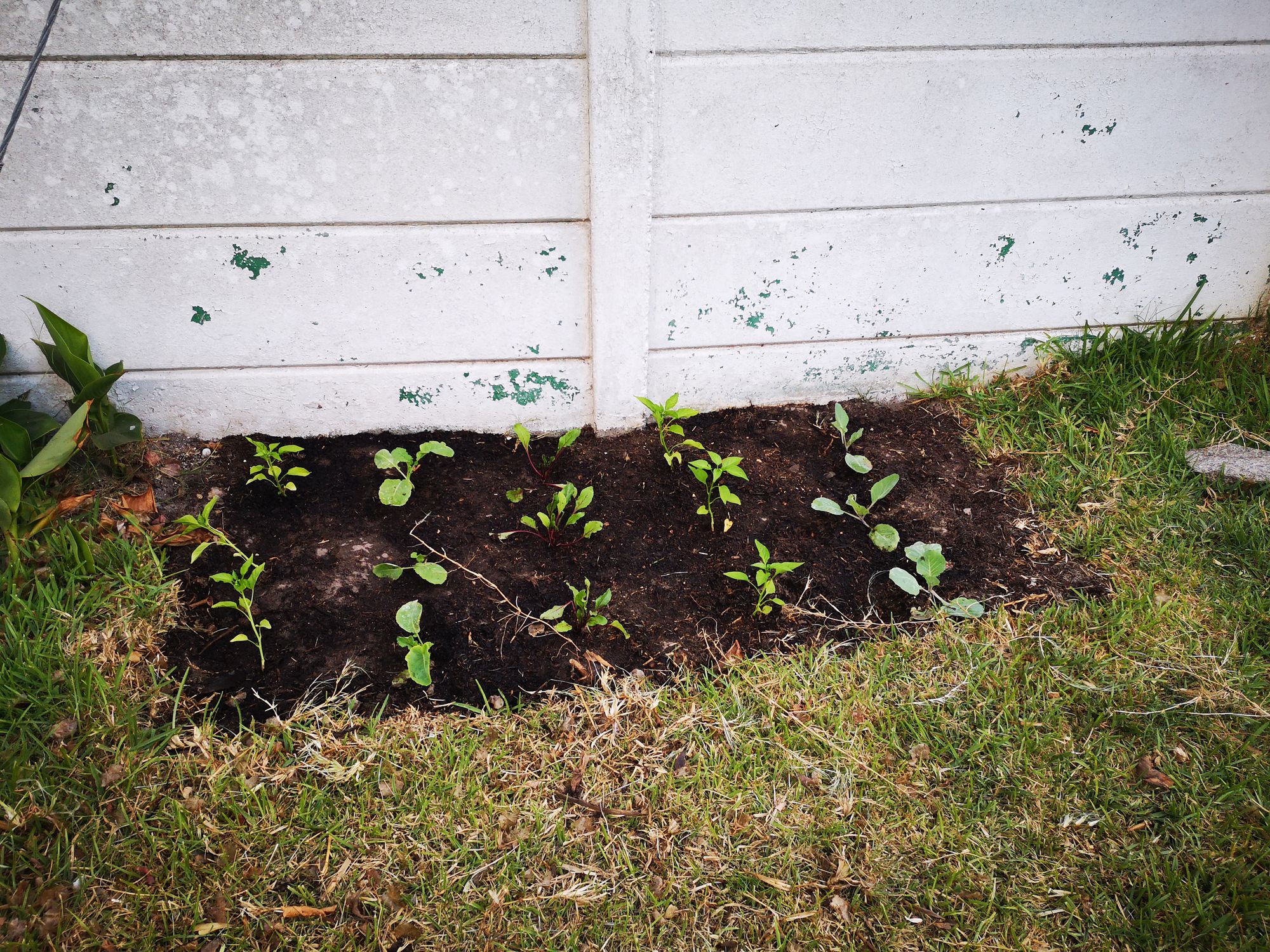Nikiwe Solomon
Stories of Relating in a Time of Covid-19

Where two rivers meet. To the left, the Kuils River and to the right, a man-made channel dubbed by the locals as the ‘Kak Rivier’ which deposits effluent water from the near Waste Water Treatment Works. The image also tells the story of two versions of Cape Town, deemed as one of the most unequal cities in the world. Photo: Nikiwe Solomon
To my dear children
A few days ago, I got off the phone with your aunt and one thing we kept saying was “In our lifetime.” When we were your age, we used to swim in the Matshemhlophe River after the rains in Bulawayo. But in my lifetime, I have seen that river turn black. It doesn’t flow anymore but rather sludges along. And when the economy in Zimbabwe crashed, the family had to move back to South Africa. Then came xenophobic attacks, increasing inequality, power failures, the drought, the rand fell and so on and so on. We thought we had finally reached the bottom when Cape Town almost ran out of water.
We had to fetch water from the springs in Newlands and Muizenberg. That should have taught us a lesson, right? That we need to keep all our water sources clean should we ever have to face another Day Zero? But I guess we didn’t get scared enough because I got a call from one of the community members I work with saying that the Kuils River that they live right next to was so full of chemicals and things it was making them sick. I thought, “Haven’t we already reached the proverbial rock bottom since our dams started to look like desert wastelands?” The lack of water showed us the inequalities in this country and the only way to move was up.
But something happened and a lot has changed. The pandemic called Covid-19 put the world at a stop. And when we stopped, we started to listen more carefully. We listened with care and full attention. Or so we thought.
I had just finished writing some notes on a clipboard, the patient seemed to be getting better. Nursing staff wearing gloves and a mask handed me two vials that needed to be sent to a lab to get tested. Everyone was busy so I decided to take it to the lab myself. I walked over to the next ward, I was stopped at the door, my temperature was tested. Oh no, I had a fever. I handed over the vial to the nurses on duty. I was sprayed and wiped down, told to change into a hospital gown; I was being admitted into the hospital right now. I proceeded to remove my clothes; these were then placed in a plastic bag. I was sprayed and wiped down and by the time I was done, all my belongings from my workstation were placed next to me on a bed at the entrance of the ward, being sprayed and wiped down. I searched frantically for my phone to call your father because I had to let him know I wouldn’t be coming home tonight. He had to pick you up, get supper ready, make sure you do your homework because I wasn’t coming home tonight. I couldn’t find my phone. I continued to look for it under the laptop, the heaps of notebooks, the keypad of desktop and I found a phone. But it wasn’t mine. I hear a ringing in the background. I am told I need to move to the ward now; I must leave everything behind because it might be contaminated. The ringing continues. I shout it might be my husband; I need to let him know that I am okay but I won’t be coming home tonight. I am gently pushed away from all my belongings, guided past a set of white curtains, bare feet on cold sterile floors.
On the 27th of May 2020, Okuhle Hlati of Cape Times news reported that nurses at a private hospital in Pinelands, Cape Town were infuriated by the negligence and discrimination by senior management after testing positive with Covid-19. About 36 of the nursing staff tested positive and they reported that management accused them of bringing these infections from their communities. A voice message sent by management stated that investigations were done and the results indicated that there was no way the infection could have occurred in the hospital, it was most likely that these nurses were infected while in their communities or in the transportation that brought them to and from work.
The hospital is located in the plush, a relatively wealthy neighbourhood of Cape Town that is unaffordable to the majority of South Africans. The nurses and care staff live on the other side of the railway tracks in more populated neighbourhoods, relying on public/shared transport to get to work. The spatial planning of the apartheid era is still rearing its ugly head today. The nurses who tested positive were told to self-isolate at home and if they could not do that, they were required to bring their identity document and medical aid cards to self-isolate at the hospital. Every day they placed themselves at the front lines of the pandemic, caring for others. But when the time came for them to be cared for, only if they had enough money to pay up their medical aid every month could they stay in the very same hospital they worked in every day.

While the country is under lock down, Nikiwe Solomon homeschools her children and teaches them how to garden. Photo: Nikiwe Solomon
In many cities in Zimbabwe, which your father and I left a long time ago to set up a better life for our family, doctors and nurses posted messages, some in tears, exhausted from the amount of work they did with the extremely little they had. They were incapacitated by the lack of equipment to provide adequate care for their patients, often sending them off with painkillers because that was the sum of care that they could give. Underpaid (a paltry US $200 per month) and overworked, strike after strike, to no avail. The government told the doctors to stop being selfish and get back to work. Only after billionaire Strive Masiyiwa offered assistance of between US $290 and 580 for six months depending on seniority did they agree to go back to work. Even with the increase, many found the conditions untenable because they lacked the basics such as gloves and masks to provide care for their patients without consistently placing their own lives at risk. The country has been hit by epidemics of typhoid and cholera over the years, when news broke of the widespread COVID-19, fear once again struck in the hearts of healthcare workers. How would they cope? Your father and I wondered what our lives would have been like if we had stayed. Would we have been forced to hustle, too, just to make ends meet? Would we also be heavily reliant on the black market, which seems to be more stable than the actual government? What would your lives have been like?
My feet are cold, my body is stiff, the ground is so cold. Someone next to me coughs again. I am up now. I can’t get back to sleep. It’s getting light outside. I must get up anyway. I pull myself out of my sleeping bag and whisper to the lady sleeping near me, “Please watch my stuff, I will be back; I just need to use the toilet.” The other woman lying next to me says, “Me too, let’s go together.” I make my way past other bodies, hundreds of them, some gently snoring and others stirring as the sun rises. I get to the toilets and there is already a queue. I wait, I have to wait even though I feel I am about to burst. My body still aches from last night. My stomach growls, I need to eat.
And now we live in Cape Town, but it has its own challenges. While we lived a relatively comfortable life, worried about if we will still have jobs if the pandemic was to continue, hundreds of homeless people around Cape Town were rounded up and relocated to the Strandfontein Sports Ground where tented shelters were set up when the coronavirus lockdown came into effect at the end of March 2020. The cost of setting up this camp was R30 million over one month. The shelter has been embroiled in controversy, with concerns of health and safety for the new residents being raised. The South African Human Rights Commission (SAHRC) made scathing findings on the conditions in which the thousands of homeless people at this shelter were living. While the city reported that best efforts were being made to provide healthcare, security and entertainment for those living there, NGOs reported concerns that these provisions were inadequate, especially to allow for social distancing. Reports also emerged of a young woman who was raped at the camp and officials stated the suspect was apprehended. The City’s law enforcement officers were also issuing fines to residents of this shelter for failure to comply with lockdown rules. Failure to pay the fine or appear in court could result in imprisonment. After conflicting statements from city officials, residents of the camp and NGOs working the camp, the matter was taken to court. The City of Cape Town has now closed the infamous shelter.
The opening of the shelter struck a nerve for many South Africans, with the planning and enforcement being reminiscent of the apartheid forced removals in the 1960s of the black and coloured people from homes close to services and the central business district to the Cape Flats.

Under level 3 restrictions in South Africa, walks along the Green Belt are permitted. Photo: Nikiwe Solomon
In Zimbabwe, where the official unemployment rate is only 5% (although reality and fact checkers stated that the number is closer to 95%), the introduction of the lockdown to prevent the spread of COVID-19 brought its citizens to their knees. Many relied on informal trading for sustenance and the inability to leave their homes increased food insecurity for many families. It was reported that President Mnangagwa’s son, Collins, on the other hand earned approximately R17 million from this crisis. Collins Mnangagwa and his friend Delish Nguwaya set up a company to distribute PPE kits to the health ministry. So scandalous was this transaction that Delish Nguwaya was arrested, however nothing has been said about the arrest of Mnangwagwa. In the midst of this, the Zimbabwean president condemned the killing of George Floyd and yet turns a blind eye to the slow death of thousands of his citizens due to hunger and poor healthcare. In response to the upheaval and instability around the world, the president called for a day of fasting and prayer. Political and social commentators and journalists said this call was a mockery, a punch in the gut and a failure to read the room or a concerted effort to ignore the realities of the country. How do you ask a citizenry to go on a fast when they told you over and over again that they are dying of hunger?
It was getting dark and I hated being at the food market this late. It was always such a mess at the end of the day. Also, I hadn’t walked in that part of Harare for a long time and expected the streets to be isolated, making me an easier target for thieves. But I was surprised to see so many people lined up along shop walls, laying down cardboard and pulling out blankets as if they were getting ready to lie down for the night. I stopped and asked an old woman holding the hands of who I assume were her grandchildren what was going on. I thought people were just setting up to queue for cash withdrawals at the bank as this had now become normal practice in Zimbabwe. But what she told me cut really deep. She had a stall in the marketplace where she sold fresh vegetables. When they left home two days ago, the money they had was enough for transport into town and back and maybe even a loaf of bread. But because of the inflation of the dollar in Zimbabwe, she couldn’t afford to take herself and her grandchildren home and come back into town to sell at her stall. She said that it made more sense to spend nights sleeping under the shelter on a shop entrance than to spend more money trying to get home. To me, it didn’t make sense at all. How could a woman struggle so much to put food on the table… just food… the basic needs… while the children of the political elite could buy the latest car and sneakers and then flaunt it all over social media? How was this okay? That also meant she couldn’t afford to send her grandchildren to school or buy them warm clothes to comfortably endure the cold nights of sleeping on a pavement. How was this okay? How was this even real?
It all feels surreal, between states of dreaming and being awake, not knowing which is which. The presence of the virus has made society’s fault lines more visible: social inequality with millions of people across the globe applying for unemployment benefits, gender inequality with women often bearing the load of childcare and working from home, ecocide, ageism, sexism, racism and more. Covid-19 has further highlighted the brutality of neoliberalism, which reduces people and multi-species worlds to numbers. If you can count the number of people who have been infected using scientific methods to model the spread of the disease, the assumption is that with enough resources (capital) and technical interventions, you would be able to manage the pandemic. However, the local (such as those mentioned above) and global events have shown us that these three gods of reason – scientific objectivity, technical efficiency and economic productivity – are not enough to respond to the challenges of our time and what will be the challenges of your time. What we have done is put the economy above all else, hoping that its growth would improve the lives of the majority of the earth’s inhabitants. But what this has revealed is the increase in the gap between the haves and the have-nots, the exploitation of nature and the poisoning of our water and soils.
This has probably been one of the most difficult things I have had to write. I wondered do I stick to the script or do I flip the script? I wanted this letter to be filled with hope. Every time I had these dreams, I woke up and thought about you, what will happen to you, your cousins and friends, and I am struck with fear and dread. I think of how you will all look back and say, “What did you do? How could you let things get so bad?” I would have wanted the message to you, future generations, to be that we finally came together as humanity in the face of a global pandemic, economic collapse and environmental degradation. That we tried and we worked hard to change because a virus that does not discriminate based on race, class, gender forced us to.
But every time I opened a newsfeed or went on social media I saw the number of coronavirus cases increase in the same way cases of intolerance and discrimination targeted at mostly black bodies increased. The virus may not discriminate, but healthcare systems do, governance systems do, policing systems do. The moment we are living in is something many in my generation never imagined would happen in our lifetime. We found ourselves looking at newsfeeds and asking each other again and again, “Is this for real?” Because we had seen some of the things we have witnessed in movies and read about them in books, which became parts of our dreams. So fact checking has become a pastime for some and others use the line ‘truth is subjective’ to make sense of a topsy-turvy world or justify their disillusionment. Ours is a time of post-truth. The truth is that the virus spread from an animal to human and from human to human and yet governments delayed putting measures in place to respond to pandemics and the rapid decline in species habitats in the Anthropocene era. The truth is that reliance on the markets to sustain and improve lives has not worked. So how do we do better?

The work of Solomon's children, the vegetable patch begins to thrive. Photo: Nikiwe Solomon
But it is also true that in this time of crises, millions of people across the globe have come together to speak out about the injustices of a system that exploits and marginalizes non-conforming bodies and the environment. In our communities, we have seen people think collectively about food sovereignty, providing for those without. In Cape Town, some neighbourhoods have partnered with NGOs to ensure that less privileged families receive food each week. In Harare, we have seen individuals donating necessities to communities in need. I have seen the explosion of the Black Lives Matter movement across the globe calling for restorative justice in a system that brutalizes people of colour. In moments asking “Is this for real or am I dreaming?” sparks of hope emerge because of small acts by people. Central to all of these movements is an ethics of care because people and the environment matter more than maintaining systems of privilege and dominance. So I encourage you to hold on to that hope that people care enough to stand up for each other. It may take a lot of time, attempts and failures, but throughout history, people have come together in moments of crisis to pave a better way to live. As long as we keep trying there will be hope.
Let our stories be a cautionary tale. Learn from how we lived and what we considered important. I don’t know what the future holds, but I hope the stories that will emerge are stories of how our generation pushed back the world over and no longer accepted the inequalities and exploitation of people and the planet. If not … I hope we at least gave you the tools to know how to keep fighting. I look at you now and I do see hope. A light, like at the break of dawn, because you have learnt to ask questions, to challenge my thinking. I hope you continue to do this and hope you know that I will keep trying, for you and yours.
With all my love,
Nikiwe
About the artist
Nikiwe Solomon is a lecturer in the Social Anthropology Department at the University of Cape Town and currently pursuing a PhD in Environmental Humanities. Her PhD research focuses on the Kuils River in Cape Town, its entanglement with social and political worlds as well as in urban planning. Solomon is also a Research Associate at the African Centre for a Green Economy where she practices the integration of theoretical knowledge with the experience of the everyday. Her work at the African Centre focuses on civil society and community engagement platforms committed to human and environmental well-being.